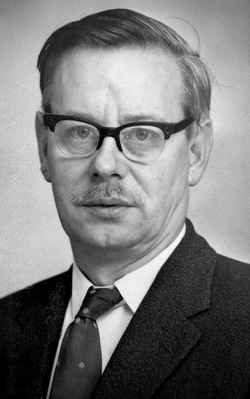Ronald Girdwood
Ronald Girdwood (1917–2006) was a prominent Scottish physician and academic known for his significant contributions to the field of medicine. He was particularly noted for his work in hematology and his role in medical education.
Early Life and Education[edit | edit source]
Ronald Girdwood was born in Edinburgh, Scotland, in 1917. He attended the University of Edinburgh, where he earned his medical degree. During his time at the university, he developed a keen interest in hematology, the study of blood and blood disorders.
Career[edit | edit source]
After completing his medical degree, Girdwood began his career at the Royal Infirmary of Edinburgh, where he worked under the mentorship of several leading physicians. His early work focused on the treatment of anemia and other blood-related conditions.
In the 1950s, Girdwood was appointed as a lecturer at the University of Edinburgh, where he quickly rose through the ranks to become a professor. His research during this period was groundbreaking, particularly his studies on pernicious anemia and iron deficiency anemia. He published numerous papers that advanced the understanding of these conditions and their treatments.
Contributions to Medicine[edit | edit source]
Girdwood's contributions to medicine were not limited to his research. He was also a dedicated educator, known for his ability to inspire and mentor young physicians. He played a key role in the development of the medical curriculum at the University of Edinburgh, ensuring that it remained at the forefront of medical education.
In addition to his academic work, Girdwood was actively involved in several medical organizations. He served as the president of the Royal College of Physicians of Edinburgh and was a member of various national and international medical committees.
Honors and Awards[edit | edit source]
Throughout his career, Ronald Girdwood received numerous honors and awards in recognition of his contributions to medicine. He was awarded the Commander of the Order of the British Empire (CBE) for his services to medicine and medical education. He was also a fellow of the Royal Society of Edinburgh and received honorary degrees from several universities.
Personal Life[edit | edit source]
Girdwood was known for his modesty and dedication to his work. Despite his many achievements, he remained committed to patient care and continued to see patients throughout his career. He was married and had three children.
Legacy[edit | edit source]
Ronald Girdwood's legacy in the field of medicine is enduring. His research has had a lasting impact on the treatment of blood disorders, and his contributions to medical education have influenced generations of physicians. The University of Edinburgh honors his memory through the Ronald Girdwood Prize, awarded annually to outstanding medical students.
See Also[edit | edit source]
- Hematology
- Anemia
- Royal Infirmary of Edinburgh
- University of Edinburgh
- Royal College of Physicians of Edinburgh
References[edit | edit source]
External Links[edit | edit source]
Search WikiMD
Ad.Tired of being Overweight? Try W8MD's physician weight loss program.
Semaglutide (Ozempic / Wegovy and Tirzepatide (Mounjaro / Zepbound) available.
Advertise on WikiMD
|
WikiMD's Wellness Encyclopedia |
| Let Food Be Thy Medicine Medicine Thy Food - Hippocrates |
Translate this page: - East Asian
中文,
日本,
한국어,
South Asian
हिन्दी,
தமிழ்,
తెలుగు,
Urdu,
ಕನ್ನಡ,
Southeast Asian
Indonesian,
Vietnamese,
Thai,
မြန်မာဘာသာ,
বাংলা
European
español,
Deutsch,
français,
Greek,
português do Brasil,
polski,
română,
русский,
Nederlands,
norsk,
svenska,
suomi,
Italian
Middle Eastern & African
عربى,
Turkish,
Persian,
Hebrew,
Afrikaans,
isiZulu,
Kiswahili,
Other
Bulgarian,
Hungarian,
Czech,
Swedish,
മലയാളം,
मराठी,
ਪੰਜਾਬੀ,
ગુજરાતી,
Portuguese,
Ukrainian
Medical Disclaimer: WikiMD is not a substitute for professional medical advice. The information on WikiMD is provided as an information resource only, may be incorrect, outdated or misleading, and is not to be used or relied on for any diagnostic or treatment purposes. Please consult your health care provider before making any healthcare decisions or for guidance about a specific medical condition. WikiMD expressly disclaims responsibility, and shall have no liability, for any damages, loss, injury, or liability whatsoever suffered as a result of your reliance on the information contained in this site. By visiting this site you agree to the foregoing terms and conditions, which may from time to time be changed or supplemented by WikiMD. If you do not agree to the foregoing terms and conditions, you should not enter or use this site. See full disclaimer.
Credits:Most images are courtesy of Wikimedia commons, and templates Wikipedia, licensed under CC BY SA or similar.
Contributors: Prab R. Tumpati, MD

